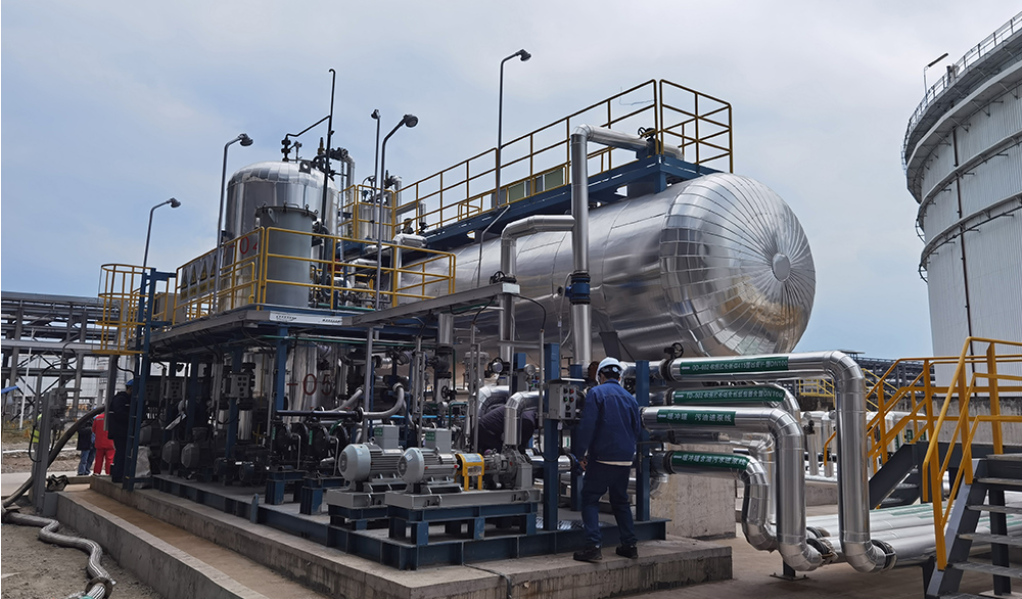The Pretreatment Process for Wastewater from the Refinery Tank Farms Dewatering
Dewatering in refinery tank farms refers to a critical step in petroleum refining where water settled at the bottom of storage tanks is separated from crude oil. This process aims to effectively remove accumulated water from the crude oil to maintain oil quality and ensure the safe operation of storage facilities. Dewatering is not only essential for the smooth functioning of refineries but also plays a vital role in minimizing environmental pollution and enabling resource recovery.
The major pollutants in wastewater generated from refinery tank farm dewatering include oil, suspended solids(SS), chemical oxygen demand (COD), and so on. These contaminants mainly originate from cooling water from pumps and machinery, condensed water, and water used in washing oil products or hydrocarbon gases. Such oily wastewater typically exhibits high oil concentrations—particularly in effluents from desalting units, oil-water separators, and tank dewatering facilities (especially crude oil tank dewatering)—ranging from 500 mg/L to 1,000 mg/L. COD levels are also relatively high, generally around 1,000 mg/L.
The challenges of wastewater treatment from dewatering operations at refinery tank farms primarily manifest in the following aspects:
Incomplete Separation: Crude oil and water are often intimately mixed within storage tanks. Inadequate treatment can leave residual moisture and impurities, adversely affecting oil quality.
High Treatment Costs: Conventional technologies—such as gravity settling, hydrocyclones, and membrane-based treatment—typically require substantial energy consumption and of chemical additives, leading to increased operational expenses.
Safety Hazards: Delayed or insufficient dewatering can cause unstable pressure and temperature conditions inside tanks, potentially triggering incidents such as fires or explosions.
Environmental Pollution: If the wastewater generated during dewatering is not properly treated before discharge, it can pose significant environmental risks due to its high oil content and other pollutants.
To address the challenges of wastewater from dewatering in refinery tank farms, Sinokle has developed a highly efficient and environmentally friendly process. Centered around a "high-efficiency coalescing oil-water separator + CDFU (Cyclonic Dissolved Gas Flotation Unit)" system and integrated with additional filtration equipment, this process achieves purely physical oil-water separation.
Wastewater from Tank farm dewatering first flows into a buffer tank, then is pumped to a high-efficiency coalescing oil-water separator for primary treatment, where the majority of oil and SS are removed. The effluent subsequently enters the CDFU for advanced treatment, reducing oil and SS concentrations. This process lowers the effluent oil content to below 100 mg/L, after which the water is directed to downstream treatment units for further polishing, ultimately achieving compliance with discharge standards.

Figure 1. On-site Equipment for Refinery Dewatering Effluent
Technical Advantages
High Efficiency: Leveraging advanced technologies and equipment, the system efficiently and rapidly removes various impurities and pollutants from wastewater, achieving a treatment efficiency of over 95%.
Compact Footprint: The skid-mounted design significantly reduces the overall footprint of the package, conserving valuable land resources.
Chemical-Free Operation: Utilizing purely physical separation mechanisms for demulsification and oil removal, the process requires no chemical additives—minimizing sludge generation, lowering disposal costs, and eliminating the risk of secondary pollution.
Stable Performance: The system exhibits strong shock resistance and can reliably handle significant fluctuations in influent quality, ensuring consistent effluent quality.
Significant Economic Benefits: Recovered oil can be directly returned to crude oil storage tanks for reuse, generating tangible economic value.
High Automation and Operational Convenience: The skid-mounted units are highly automated, easy to operate and maintain, feature short construction timelines, and can be deployed online with minimal disruption—substantially reducing labor and management costs.
